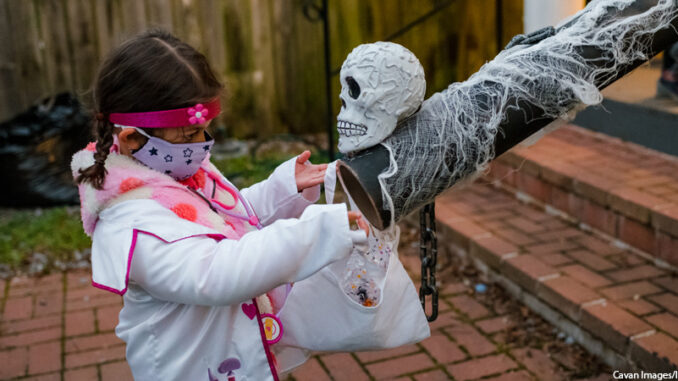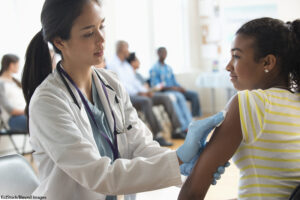
November 2nd is Election Day
Next Tuesday, November 2, 2021 is Election Day in the United States. There are many political races happening in local communities in every state of the nation. There will be elections for community school boards, city councils, mayors, local sheriffs, and more. At the state level, there may be races for judges, special elections for members of your state legislature.
Take a look at the political issues important in your community and talk to adults who are preparing to vote. What are they focused on in their political preparations? Check back on the Election Central website next week to see a summary of some important political results from Election Day.
COVID Trick-or-Treating Safely
As Halloween approaches again during the COVID-19 pandemic, you may be wondering if it’s safe to trick-or-treat. This is especially true for kids twelve and younger, who aren’t eligible yet to be vaccinated. The Centers for Disease Control (CDC) have issued guidelines this year that explain safety protocols to keep people safe while allowing Halloween fun to proceed.
Dr. Anthony Fauci, the nation’s top infections disease expert said that trick-or-treating is safe for even young children. This is because more and more people are getting vaccinated and because trick-or-treating takes place outside. Plus, scientists have shown that the risk of passing the disease on candy wrappers is low. Even so, additional safety precautions are recommended when going door-to-door. These precautions include:
- attending outside Halloween events only;
- limiting trick-or-treating to small groups;
- staying home if you feel sick;
- using hand sanitizer frequently; and
- wearing a mask.
It isn’t necessary to quarantine candy before eating it. For people handing out treats, experts recommend that you do so outside, and that you line up individually wrapped treats on a table rather than having children dig through a bowl. Crowded, indoor Halloween parties or dances are still not a good idea, however.
Dig Deeper Create a poster aimed at younger children to teach them about Halloween safety during COVID-19. Remember to use images and simple text.
Remembering General Colin Powell
General Colin Powell was born in Harlem, New York, in 1937–the son of Jamaican immigrants. He served combat duty in Vietnam, and later became the first African American National Security Adviser under President Ronald Reagan. Powell was also the first African American chairman of the Joint Chiefs of Staff under President George H.W. Bush. Powell then became the first African American Secretary of State in President George W. Bush’s administration. He received a Congressional Gold Medal in 1991, a Bronze Star, two Purple Hearts, and twice earned the Presidential Medal of Freedom.
General Powell was well respected because of his many years of service in the military and as a high-ranking government official. One point of public disapproval towards Powell was his testimony to the United Nations that Iraq was hiding weapons of mass destruction. This was cited as a reason for the 2003 War in Iraq. It was later discovered that Powell’s testimony was based upon incorrect intelligence information. Powell himself described this as a “blot” on his record.
Though Powell served three Republican presidents, he did not agree with the direction that the GOP was taking in the last decade. He left the Republican Party and began to use his influence to help promote Democrats, especially President Barack Obama.
General Colin Powell, died on October 18, 2021, from cancer and COVID-19. He was 84 years old.
Dig Deeper Using the story above and Internet resources, create an annotated timeline of General Powell’s career.
France Bans Plastic Packaging
Did you know that almost forty percent of all fruits and vegetables are sold in plastic packaging? Starting in January 2022, France will ban plastic packaging for most produce items. The list of items to be sold without plastic packaging includes about thirty fruits and vegetables, such as bananas, apples, and oranges. These produce items can be packaged with reusable or recyclable materials such as cardboard. They can also be sold as separate items with no packaging. Experts estimate that this will prevent about one billion pieces of plastic packaging from finding their way into landfills each year.
Not everyone is happy about the switch, however. The fruit sellers’ federation of France is concerned about having to make the jump to cardboard in such a short time. Also, they say, keeping the items loose isn’t safe, because people will touch and squeeze the fruit, potentially spreading germs to others. Supporters of the ban explain that plastics are a critical environmental hazard because they take so long to break down. Plastic bags, for example, take twenty years; plastic bottles take 450 years; and plastic silverware takes more than one hundred years to break down. Styrofoam never breaks down.
France has been a world leader in its commitment to limit the use of disposable plastic items. For example, in 2021 it banned plastic straws, cups, and utensils, as well as Styrofoam takeout containers. Starting next year, fast food restaurants will no longer be allowed to sell plastic toys. Water fountains will have to be readily available in public spaces to reduce the number of single-use plastic water bottles heading for the landfills.
What Do You Think? Come up with a list of at least five ways that you can reduce plastic waste in your own household. Share the list with your classmates.
Update on COVID-19 Vaccine Booster Shots
There are many questions being asked about how best to protect the population from the spread of COVID-19. One of the questions is whether vaccinated people need a booster shot. Is it okay to get a booster from one pharmaceutical company if you got your first shot from another? Who is eligible for a booster shot, and when? And when will children under twelve be able to receive a vaccine?
Earlier in October 2021, the Food and Drug Administration (FDA) approved booster shots from both Moderna and Johnson & Johnson. (The Pfizer booster was already approved back in September.) That means that for everyone who received a one-dose Johnson & Johnson shot, it’s safe to get a second shot. People who got the Moderna vaccine the first time are also eligible for a booster. The National Institutes of Health also found that it’s safe to “mix and match” vaccines, meaning that if they received the Moderna shot the first time, they can receive the Pfizer booster with no concerns, and vice versa. In fact, early data suggests a vaccinated person might even receive a slightly higher level of protection if their shots are mixed. This is good news, because it means that it will be easier to vaccinate as many people as possible.
So who should get a booster? Ongoing medical studies show that the protection provided by the first two shots decreases over time in certain vulnerable populations. It’s recommended that they get a booster
- if they’re 65 or older;
- if they are at high risk of being exposed to COVID-19;
- if they’re immunocompromised; or
- if they’re at high risk of experiencing severe symptoms if they do become infected.
New data is showing that the Pfizer vaccine is 90 percent effective for kids ages five to eleven. The FDA and the Centers for Disease Control (CDC) may decide in the next few weeks whether these vaccines will be approved for this age group.

